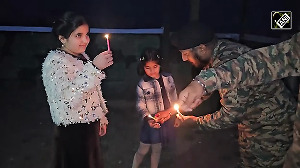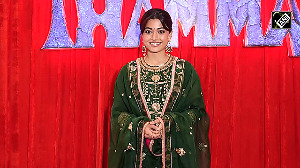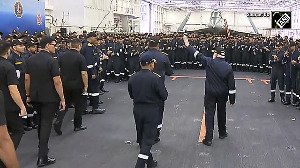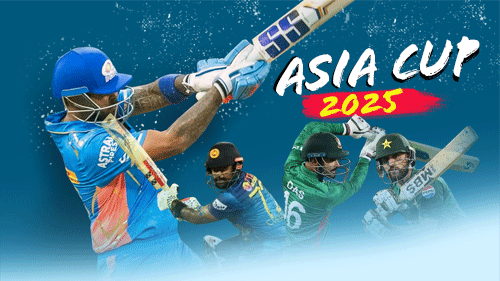Indian sports probably never had it so good as the country emerged as a new powerhouse, riding on some exceptional individual and team performances in the year 2003.
Cricket, the sport that sets the nation going, provided the silver lining with the team reaching the 2003 World Cup final in South Africa and storming the Australian fortress with a rare Test win at Adelaide.
Hockey won back a great number of fans after wins against arch-rivals Pakistan en route to the Asia Cup and Afro Asian Games triumphs.
Among individuals, Anju Bobby George's historic leap to glory to claim a bronze medal in the World Championship in Paris turned out to be the defining moment for Indian sports.
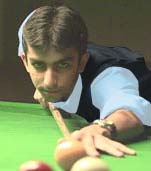 India also brought home the World Rapid Chess title thanks to Viswanathan Anand and the World Snooker crown -- courtesy 19-year-old Pankaj Advani.
India also brought home the World Rapid Chess title thanks to Viswanathan Anand and the World Snooker crown -- courtesy 19-year-old Pankaj Advani.
"Million-dollar" golfer Arjun Atwal rewrote history by becoming the first Indian to qualify for the USPGA Tour and also became the second in a row to claim the Asian PGA Order of Merit title after Jyoti Randhawa.
The country had more to rejoice as it won the bid to host its first Commonwealth Games in 2010 flashing the success card of Afro-Asian Games.
Controversies, for once, took a backseat although there was enough drama over naming of the Arjuna Awardees, World Cup contracts and bribery allegations involving Maharashtra batsman Abhijit Kale and two national selectors.
What made the emergence of India as a sporting power especially remarkable was the performance of its juniors.
That the root is healthy was proved by the volleyball team which went down fighting to giants Brazil in the Junior World Championship final in Thailand.
The cricket colts rode on the heroics of Irfan Pathan Jnr, who claimed a record nine-wicket haul, to return from Pakistan with the Under-19 Asia Cup in their kitty.
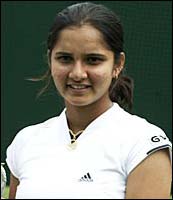 Teenager Sania Mirza heralded the coming of age of the new generation tennis players winning the junior doubles Wimbledon title in July. The 18-year-old had shown promise of better things to come when she reached the semi-finals of French Open along with countrymate Sanaa Bhambri two months earlier.
Teenager Sania Mirza heralded the coming of age of the new generation tennis players winning the junior doubles Wimbledon title in July. The 18-year-old had shown promise of better things to come when she reached the semi-finals of French Open along with countrymate Sanaa Bhambri two months earlier.
Also kindling hope was youngster Rehan Poncha who set the swimming pool ablaze with records galore in nationals.
Disciplines like shooting and boxing finally made the country sit up and take notice. Shooters Anjali Bhagwat, Rajyavardhan Rathore and Abhinav Bindra emerged as role models after grabbing quota places for the Athens Olympics while poor cousins -- archers Dola Banerjee and five others also booked berths for Athens by virtue of their performance in the World Outdoor Target Championship in New York.
Weightlifters, led by Olympic Games bronze medallist Karnam Malleswari, made their mark in the Commonwealth Championship in Tonga, winning nine gold medals and three silver besides the women's team gold.
Wrestlers were not far behind either with Sujit Kumar Mann (74kg) and Sushil Kumar (80kg) excelling in the World Freestyle Championship in New York and earning berths to Athens next year.
Football was another sport in which the players outdid expectations.
Although the country struggled to dribble past mediocrity, there was great cheer when East Bengal became the first Indian club to claim an international title after it upset Thailand's BEC Tero Sasana 3-1 in the final of ASEAN Cup Club Championship in Jakarta.
Inspirational captain Baichung Bhutia was adjudged the Most Valuable Player of the tournament, an honour which contributed to his picking up by a top Malaysian club to play in its domestic league. But Bhutia's inspiration -- I M Vijayan -- brought the curtains down on his international career after playing his last match at the Afro-Asian Games in November.
India had its share of disappointments and heartbreaks as well.
The Indian hockey team, which went into the Champions Trophy on the back of triumphs in a double-leg tournament in Australia and the four-nation Hamburg Tournament, came a cropper to finish a disappointing fourth in the prestigious six-nation tournament. Rubbing salt on India's wounds was a thrashing at the hands of Pakistan in the bronze medal play-off.
In the Cricket World Cup, the story was different. India beat Pakistan convincingly in the league stages and marched in to the final only to run into a rampaging Australia who crushed them by 125 runs.
Indian fans were generous in forgiving the team for its insipid show in the World Cup final because they realised that the larger gains outweighed that performance.
Sachin Tendulkar and Sourav Ganguly emerged as the highest run getters of the tournament while Javagal Srinath, who announced his retirement late in the year, Zaheer Khan and Ashish Nehra contributed to India's success with the ball.
The eight wins in a row also proved that skipper Ganguly had instilled aggression and fresh attitude in the team, qualities that came to the fore when the team visited Australia late in the year.
Shrugging off the tag of the underdogs, India did the unthinkable as they recorded a historic victory in the second Test at Adelaide to take a 1-0 lead in the four-match series.
Rahul Dravid and VVS Laxman did a Kolkata en core to stitch another epic partnership and the unpredictable Ajit Agarkar came up with his first five-wicket haul to force the Aussies into submission.
Cricket may have dominated the sports scene but other disciplines were quietly coming on to their own to highlight the country's all round sporting achievements.
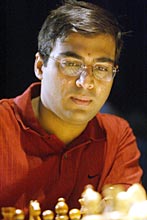 The country's Chess players, led by the 34-year-old magician Viswanathan Anand, made news on account of their performances on the international scene.
The country's Chess players, led by the 34-year-old magician Viswanathan Anand, made news on account of their performances on the international scene.
Anand started the year in style winning the Corus Grandmasters' title in Holland before adding five more presitigious titles to his kitty.
Anand outwitted Grandmaster Judit Polgar to claim his third successive Mainz Classic title and also won the World Rapid Chess in France to register two of his most memorable triumphs.
Announcing their arrival on the big stage, GM Abhijit Kunte won the British Open while K Sasikiran won the Politiken Open and the North Sea Cup in Denmark.
India also stamped their regional supremacy bagging both the men's and women's titles in Asian championships even as the country got two new Grandmasters in R B Ramesh and Sandipan Chanda.
The overall performances coupled with the incident-free staging of the inaugural Afro-Asian Games (AAG) in Hyderabad -- emerging as the new sporting capital -- worked in India's favour as New Delhi won the bid to stage the Commonwealth Games in 2010.
Indian Olympic Association left no stone unturned to ensure that the Games did not go to the lone contestant Hamilton, Canada, and flew in "sports ambassadors" to Jamaica for last-minute promotions.
That the AAG finally saw the light of the day came as such a relief that the mediocre standard of competition was pushed under the carpet.
If one did not take into account the 'how' factor, then India's show -- a second place finish behind Asian giants China -- was quite commendable.
Hyderabad also hosted the World Billiards championship where Geet Sethi came agonisingly close to winning the title but lost in the final to Le Lagan of England.
Hyderabad was also eyeing to host India's first-ever Formula One race, probably in 2007, after chief miniter Chandrababu Naidu paid a visit to FI chief Bernie Ecclestone in Italy.



